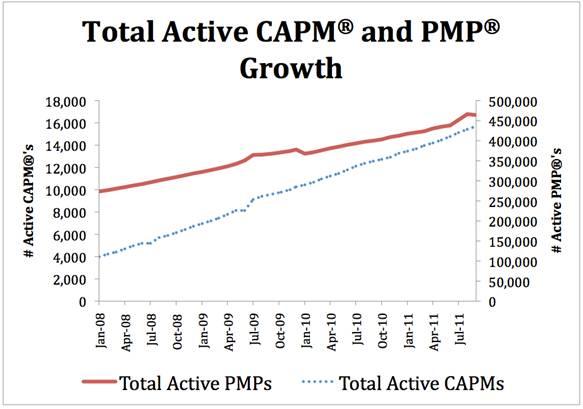Why PMP certification?
This time of year, many of us are thinking about decorating for the holidays. You might decorate your house with wreaths, your children with bows, your spouse with gold jewellery, or your table with turkey. Decorations lift our spirits, and put us in the holiday mood. This holiday season, don’t forget to decorate your name as well—with a professional certification.
By adding a dash of PMP* or a sprinkle of CAPM** to the end of your name, you are showing your peers, employers, or potential employers, that you have what it takes to ring in the new year with success.
CAPM and PMP are both powerful credentials, and their popularity and relevance within the project management industry has been growing over the past four years, as the graph below illustrates.
From January 2008 to September 2011, the number of PMP holders grew 69.7% to 464,168 PMPs. In this same time period, the number of CAPMs grew 293.5% to 15,695 CAPMs. Project management credentials are now, more then ever, a standard for project management professionals in industries all over the world.
For the PMP credential specifically, the benefits far outweigh the cost and time commitment it takes to achieve certification. It only takes a quick Expected Monetary Value demonstration to see that studying for and earning your PMP pays for itself immediately.
Once you have invested your resources to obtain this credential, what should you expect? Cheetah Learning interviewed 70 Project Management Professionals with various levels of experience, and here is what we learned…
Life after PMP certification
Everyone has their own reasons for sitting down to that four-hour exam and earning a PMP certification. Maybe you are a project manager who finally wants recognition for your knowledge and skills. Maybe you are seeking a new job or a new position within your company. We polled our project management group to see how earning a PMP has changed their careers. Following are the top three outcomes:
- Enhanced reputation within the project management community (21%)
- Promoted within current organisation (17%)
- Obtained a new job (16%)
Others reported answers include increased confidence and capabilities. As these results show, obtaining a PMP certification produces not only monetary rewards, but also the intrinsic reward that comes from feeling good about your standing within your industry.
Money Money Money! We know that many of you wish to obtain your PMP certification for the same reason that our polled group did: to earn a reputation for yourself within the project management community. But who can blame you if you also want to be compensated appropriately?
We polled our same trusty group of project managers to see how earning the PMP credential affected their earnings, and the results were impressive. The average reported increase in annual compensation after obtaining a PMP credential was US$24,556 (ranging from an annual increase of $5,000 to $63,000). What would you do with an extra $24,556 this year?
Looking for work? Look no further. Searching for a new job can be either challenging and exciting, or stressful and tiresome. This greatly depends on the length of time that you are looking before you are able to land a job.
When we asked our professionals how long it took them to find a job if they found themselves unemployed post-PMP certification, 77% of them said they were never in this situation, as their PMP provided job security and a career path that allowed them to be fulfilled in their current position. The remaining 23% who did need to make a career change reported that on average, it only took them 1.5 months (ranging from zero months to seven months) to find a new job.
This year, make sure to differentiate yourself with credentials that are worth their weight in gold. Decorate your name with PMP or CAPM, and bring on the holiday cheer.
* Project Management Professional, registered trade mark of the Project Management Institute
** Certified Associate in Project Management, registered trade mark of the Project Management Institute


